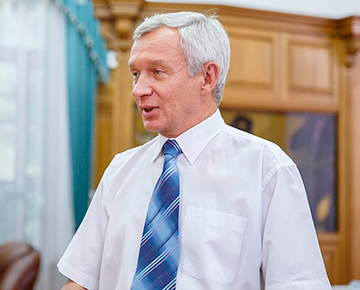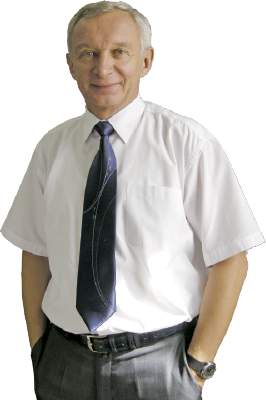 As Mr. Ablameiko says: ‘The ratings and reputation of a university (whose growth is connected with that of innovative educational processes) influence the wider culture of science and education’. With this in mind, we have decided to feature the BSU Rector interview under this issue’s topic, familiarising our readers with he who oversees the country’s leading university.
As Mr. Ablameiko says: ‘The ratings and reputation of a university (whose growth is connected with that of innovative educational processes) influence the wider culture of science and education’. With this in mind, we have decided to feature the BSU Rector interview under this issue’s topic, familiarising our readers with he who oversees the country’s leading university.
In our interview, we tackled many issues, including the path chosen by the Belarusian scientist, born in the USSR. At the age of 28 he defended his Master’s thesis and, by 34 was a Doctor of Sciences. A year later he was an acknowledged scientist in the Soviet Union.
Interestingly, he received four of his diplomas (Candidate of Sciences, Senior Scientific Researcher, Doctor of Sciences and Professor) in the USSR. At that time, the whole globe respected Soviet diplomas. In 2002 he was appointed General Director of the United Institute of Informatics, governing a large staff. In 2009 he received the major scientific title of academician.
Mr. Ablameiko is grateful to all those who taught him and who have helped him achieve his successes since. He tries to learn something from every experience and meeting, evolving as a result. As he wrote in his book Life of Cybernetics: ‘In July [2009], the President of Belarus — Alexander Lukashenko — solemnly handed diplomas to new members of the Academy. This was the end of a long [scientific] path of 30 years: challenging yet fascinating. Nevertheless, I realized that everything was beginning anew. I had been working at the University [since 2008] and faced numerous worries but my life was now set to continue at a new pace…’
As Mr. Ablameiko mentions in his book, he was happy to contribute to military projects, learning more about Soviet defensive science. He developed digital maps for guiding air-supported missiles and technologies used in the domestic space science. Interestingly, he tells us that it’s likely that much of the technology used in modern smartphones, photo cameras, computers and tablets was developed at Minsk’s Institue of Technical Cybernetics at the Academy of Sciences of the Belarusian SSR. Many developments by Belarusian scientists were openly published in specialized editions, allowing free access by anyone involved in gadget engineering.
He notes that administrative work takes 95 percent of his time but he has no regrets about taking the post of Rector. Moreover, he often writes scientific articles (over 150 published in English in international magazines and for international conferences). As a scientist and lecturer, Mr. Ablameiko has always liaised widely abroad, including with Japan, Italy, Spain, Greece, Australia, New Zealand, Hong Kong, the USA and the UK.
 Mr. Ablameiko, what does the ‘culture’ of education mean to you?
Mr. Ablameiko, what does the ‘culture’ of education mean to you?
In short, education is the process of sharing accumulated knowledge and cultural values. Culture is the flesh and blood of education — determining its structure, the logistics of teaching and the strategy of organization of educational process. The same could be applied to science. The arts envisage the use of imagination while science presupposes conceptual thinking; there’s no doubt that the latter shapes the culture of human development.
Are you pleased with the result of the QS rating? Upon what is it based?
Of course, I’m delighted, as this rating is one of the most authoritative ratings worldwide. I’m so pleased that the University’s international reputation is growing and I hope this will lead to increased interest among foreign students towards our University. Last year, we enrolled a record number of BSU students: 1,152. Two years ago, the Education Ministry allowed EurAsEC citizens to apply on the same terms as foreigners, an increasing number of youngsters are applying from such states as Russia, Kazakhstan and elsewhere. The rating has caused a stir. It’s based on analysis of data from our own establishment, as well as from polls of experts and employees (including the citation index of scientific works by the scientists from the past five years). It incorporates the ratio of lecturers to students and the number of foreign students and teachers.
How are you attracting attention to the University?
Time dictates different approaches towards modernization of the education system under the conditions of the society informatisation. In other words, we need to aim to enter the world education space. This is connected not only with online placement of our employees’ scientific publications, but also educational courses, seminars, lectures and programmes. Everything a university offers should be advertised on the Internet, since modern youngsters assess us through this source. With this in mind, every lecturer must have an e-portfolio. Of course, I understand that it’s not easy to prepare lectures and laboratory and practical works in e-form for placement online. However, this is what we now expect from our lecturers. The image of a modern university depends on this, and it also influences ratings and the ‘culture’ of science and education in general.
 Are you pleased with students’ cultural-educational level?
Are you pleased with students’ cultural-educational level?
Yes, young people are smart. I lecture the 3rd and the 4th year students, at the Applied Mathematics and Computer Science Faculty. Whatever they are asked, they know everything; they are inquisitive and curious. Moreover, they accept all information easily and it’s a pleasure to communicate and work with them.
Teachers no longer personally take part in the entrance campaign of students, who are enrolled via the results of the centralized testing. How do you assess this system?
Every system has its advantages and disadvantages. Experienced teachers dislike this system, preferring to look into people’s eyes and check future students’ paperwork. This is logical but, on the other hand, it’s also subjective. The centralized testing system is not a Belarusian ‘invention’, as the whole globe is moving towards written tests. However, the latter also has disadvantages.
Pupils who demonstrate stable progress at school rarely fail their centralized testing (especially as there is continuous testing through the academic year at schools). Generally, the system allows us to adequately assess the basic level of school graduates’ knowledge of various subjects. Usually all well-prepared alumni do well during the tests. Of course, rare exceptions occur, when someone suffers from nerves, for example.
I’d never agree with the widespread idea that modern youngsters are ‘weaker’ academically. I can only agree that some subjects of the school curriculum are taught, figuratively speaking, ‘optionally’. The tendency is easily explainable, as people now need to know much: foreign languages, IT, network technologies and artificial intelligence…
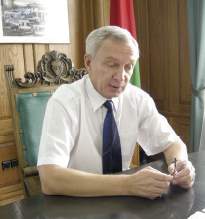 How do we compare against other countries as regards the system of university education?
How do we compare against other countries as regards the system of university education?
The Bologna Process envisages two stages of education (the first and the second). Last year, we shifted from five year education to four year studies (although not all specialties). Meanwhile, it doesn’t matter how long education lasts. Such peculiarity as an individual trajectory is also common: students might study for a decade or longer. Over ten years ago, the western universities shifted to the ‘4+2’ system; its other system is ‘3+2’ (Bachelor’s degree and post-graduate studies). In winter, the BSU was visited by the Open British University Rector who lamented their system, which offers just 19 hours of focused study each week: three hours a day if shared across six days. The BSU currently offers around 25. Even this figure is far from 19! What kind of specialists can be trained in three years? The West relies on self-education: it’s a good aspect but what then is the purpose of a university?
Is Belarusian higher education system still attractive to foreigners?
Best traditions of fundamental classical training of specialists have been preserved in Belarus, especially in sciences. The BSU still boasts fundamental education in mathematics, physics and chemistry. Wherever I go abroad, I’m asked to ‘provide’ alumni for their post-graduate courses — as ours are better prepared. As you know, foreigners come to us to study — which confirms our system’s attractiveness. Moreover, the number of foreign students is annually growing: last year, around 3,000 studied at our University and, five years ago, there were just 1,300. In total, around 17,000 foreign students came to Belarus to study (the figure is ever growing). I think this trend is directly connected with university ratings published in the media. Interestingly, in the late 1970s the BSU was among the USSR’s top 25 universities.
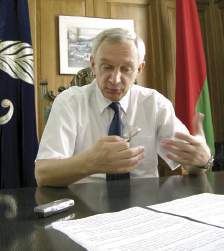 What else are you doing to attract foreigners?
What else are you doing to attract foreigners?
We participate in educational and scientific exhibitions, enjoy Internet coverage, and advertise. Moreover, we’ve also concluded agreements with some recruiting companies. China and Turkmenistan lead, each having 700 students at this time in Belarus. Europeans and Americans also study at the BSU. We lecture in Russian and are now planning to offer English language education from the first year of study (however, some problems exist in this respect).
How long have you been lecturing and do you love communicating with students?
I’ve been lecturing since 1985, after defending my PhD thesis. Of course, I love this job. On the traditional Day of the First Year Students — held at the Palace of Sports, I was pleased to take part in all festive events. I also run an electronic reception room, where I answer students’ questions and I visit our student hostels.
How did new entrance rules influence the BSU?
This year, the separate contest for rural applicants was abolished; they must now pass exams on a par with urban peers. Many talented youngsters from villages enter the BSU; only 40 percent of our students come from Minsk, others hail from other cities and villages.
You were born in a district town, weren’t you?
I was born in Voronovo [Grodno Region’s Lida District] and studied there in the 1960s. In 1973, I graduated from school. At that time, nobody knew of personal tutors. I studied well, winning district and regional Olympiads in mathematics and physics. With my friend I began a correspondence course with the Moscow Physico-Technical Institute’s Physico-Mathematical School, after eight years at school. We received higher complexity tests by post and were later invited to enrol. However, we were afraid to move to Moscow and remained in Belarus. As a result, I entered the BSU, with a single four grade (composition); my other marks were excellent.
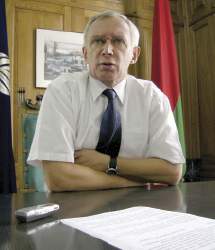 Do you ever visit Voronovo?
Do you ever visit Voronovo?
I visit often, as my 82 year old mother lives there. I also meet local schoolchildren. In addition, I’ve established an Academician Ablameiko Award for winners of the Olympiad in mathematics and IT. Talented children need support — financial and moral. My school taught me much and, now, I’m ‘repaying’ my debt.
Did your parents help you with mathematics?
My father used to solve puzzles with me and we played chess. In year ten, I had a senior degree in chess — playing for the district and region, participating in Republican competitions. I also played basketball, football and ice hockey for the school team and was twice table tennis champion (during my 9-10th years at school). So, I wasn’t just focused on mathematics and physics.
You are a team-player…
This began at school, when I solved Moscow tasks with my friend. Later, my team skills proved useful when developing space-related programmes.
Mathematics is exercise for the brain... yes?
Mathematics puts the brain in order but I’d never assume that humanitarians’ minds are in disorder. Mathematicians learn a systematic approach to calculations while humanitarians differ. My son graduated from the Belarusian State University of Informatics and Radio-electronics and my daughter is a lawyer, having graduated from the Belarusian State University. My daughter, for example, follows her intuition — and does well. I wouldn’t call myself a mathematician, as I deal with processing digital pictures and image identification: part of IT. It’s sometimes hard to draw the line here.
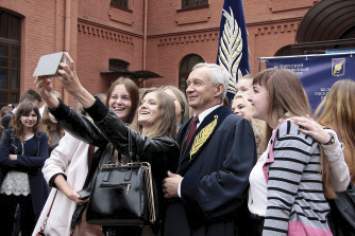
Sergei Ablameiko always celebrates the Day of the First Year Students in BSU with students
Do you ever think that we can learn from modern youngsters?
I do. We can learn much from young people — like my grandson. He is a third year pupil but truly brainy. Looking at him, I’m always impressed: modern children are so clever and know so much. I recall my childhood: in the first school year half the pupils couldn’t read or calculate. Modern pupils are well prepared, reading a great deal, so they are well developed. With my grandson, I love to solve problems. We didn’t do this in our first years at school but our children already solve such tasks easily! They are also great at using the most advanced tablets and telephones… Last year we visited caves once and, before the trip, he asked me whether we’d see stalactites, stalagnates and stalagmites. That impressed me greatly. He also told me the differences between them. I listen to brainy students with the same pleasure…
Interviewed by Valentina and Ivan Zhdanovich









